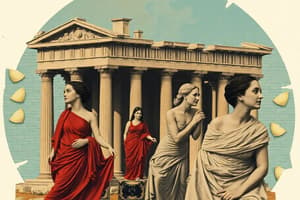Podcast
Questions and Answers
What was the Dionysia?
What was the Dionysia?
- A dramatic performance event
- A large festival in honor of Apollo
- A religious ceremony for Athena
- A large festival in honor of Dionysus (correct)
What was the Panathenaea?
What was the Panathenaea?
The most important of all the festivals at Athens in honor of Athena.
What does pollution refer to in a supernatural context?
What does pollution refer to in a supernatural context?
A supernatural stain that can infect a whole town.
Hubris is excessive pride toward or defiance of the _____, leading to nemesis.
Hubris is excessive pride toward or defiance of the _____, leading to nemesis.
What is the Delphic oracle?
What is the Delphic oracle?
What does choral lyric refer to?
What does choral lyric refer to?
Tragedy means 'GOAT SONG.'
Tragedy means 'GOAT SONG.'
Who is Aeschylus?
Who is Aeschylus?
What is the characteristic style of Sophocles?
What is the characteristic style of Sophocles?
What is Euripides' writing style characterized by?
What is Euripides' writing style characterized by?
What does 'hamartia' mean?
What does 'hamartia' mean?
What is peripeteia?
What is peripeteia?
What defines a melodrama?
What defines a melodrama?
What is the purpose of the Ekkuklema?
What is the purpose of the Ekkuklema?
What does 'parodos' mean?
What does 'parodos' mean?
What is the Orchestra in Greek theater?
What is the Orchestra in Greek theater?
What does 'skene' refer to?
What does 'skene' refer to?
Who is Thespis?
Who is Thespis?
Match the following characters with their corresponding playwrights:
Match the following characters with their corresponding playwrights:
What is the typical structure of a tragedy?
What is the typical structure of a tragedy?
What does the term 'anagnorisis' refer to?
What does the term 'anagnorisis' refer to?
What does Akrasia mean?
What does Akrasia mean?
What is Aristotle's concept of Katharsis?
What is Aristotle's concept of Katharsis?
Flashcards are hidden until you start studying
Study Notes
Festivals
- Dionysia: Ancient Athens festival honoring Dionysus, featuring dramatic tragedies.
- Panathenaea: The most significant festival in Athens, dedicated to the goddess Athena.
Themes and Concepts
- Pollution (Miasma): A supernatural stain affecting entire communities.
- Hubris (Hybris): Excessive pride or defiance against the gods, often leading to nemesis.
- Hamartia: An error or character flaw causing a protagonist's downfall.
Dramatic Elements
- Delphic Oracle: Worshipped Apollo at Delphi; known for ambiguous yet authoritative responses.
- Choral Lyric: Includes strophe, antistrophe, and epode sung by prepubescent boys.
- Melodrama: Overly exaggerated drama featuring clear conflicts and resolutions.
- Ekkuklema: Stage mechanism in classical Greek theater revealing offstage scenes.
Structure of Tragedy
- Typical Tragedy Structure: Comprises prologue, parode, strophe, antistrophe, epode, chorus, episodes, stasimon, and exode.
- Prologue: Initial exposition often delivered by a character or god.
- Chorus: Comments on the events; plays an integral role in setting the narrative tone.
Character Types
- Protagonist: The leading central character, often undergoing significant change.
- Antagonist: The character opposing the protagonist, generating conflict.
Notable Playwrights
- Aeschylus: Significant Greek playwright; credited for works such as the Oresteia Trilogy (Agamemnon, Libation Bearers, Eumenides).
- Sophocles: Known for a balanced and nuanced writing style; authored plays like Electra and Women of Trachis.
- Euripides: Focused on simple and relatable language; famous for Medea and Bacchae.
Structural Devices
- Peripeteia: Sudden reversal in the plot, marking a turning point in the narrative.
- Anagnorisis: Moment of recognition or discovery, occurring pre-reversal.
Concepts of Tragedy
- Trilogy: A set of three related plays.
- Tetralogy: Grouping of four plays, one being a satyr play.
Moral/Philosophical Ideas
- Meden Agan: Inscription meaning "Nothing in Excess," reflects the value of moderation.
- Akrasia: Weakness of will; acting against better judgment due to internal conflict.
- Aristotle's Katharsis: Emotional purification achieved through experiencing pity and fear in tragedy.
Other Notable Terms
- Agon: A formal debate or intellectual struggle within a play.
- Skene: Set piece forming the backdrop for theatrical performances.
- Orchestra: Circular space for the chorus, enhancing the performance dynamics.
Studying That Suits You
Use AI to generate personalized quizzes and flashcards to suit your learning preferences.




